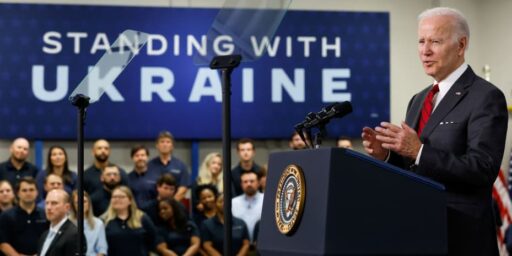Information Control in the War on Terror
PR Meets Psy-Ops in War on Terror (LAT)
On the evening of Oct. 14, a young Marine spokesman near Fallouja appeared on CNN and made a dramatic announcement. “Troops crossed the line of departure,” 1st Lt. Lyle Gilbert declared, using a common military expression signaling the start of a major campaign. “It’s going to be a long night.” CNN, which had been alerted to expect a major news development, reported that the long-awaited offensive to retake the Iraqi city of Fallouja had begun. In fact, the Fallouja offensive would not kick off for another three weeks. Gilbert’s carefully worded announcement was an elaborate psychological operation — or “psy-op” — intended to dupe insurgents in Fallouja and allow U.S. commanders to see how guerrillas would react if they believed U.S. troops were entering the city, according to several Pentagon officials.
In the hours after the initial report, CNN’s Pentagon reporters were able to determine that the Fallouja operation had not, in fact, begun. “As the story developed, we quickly made it clear to our viewers exactly what was going on in and around Fallouja,” CNN spokesman Matthew Furman said.
Officials at the Pentagon and other U.S. national security agencies said the CNN incident was not an isolated feint — the type used throughout history by armies to deceive their enemies — but part of a broad effort underway within the Bush administration to use information to its advantage in the war on terrorism.
*** These efforts have set off a fight inside the Pentagon over the proper use of information in wartime. Several top officials see a danger of blurring what are supposed to be well-defined lines between the stated mission of military public affairs — disseminating truthful, accurate information to the media and the American public — and psychological and information operations, the use of often-misleading information and propaganda to influence the outcome of a campaign or battle.
Several of those officials who oppose the use of misleading information spoke out against the practice on the condition of anonymity. “The movement of information has gone from the public affairs world to the psychological operations world,” one senior defense official said. “What’s at stake is the credibility of people in uniform.”
Unfortunately, in the era of live 24/7 satellite television, there is no way to communicate the truth to one’s own public–desirable, if not essential, in a democracy–while deceiving the enemy–necessary to save the lives of our soldiers in harm’s way as well as Iraqi non-combatants. Further complicating matters, we no longer live in an age where government officials are confident that American reporters are actually on our side. In World War II, combat correspondents wore military uniforms and were trusted with all but the most sensitive information, with officials having the utmost confidence that they wouldn’t divulge that information until the appropriate time. Nowadays, it’s a virtual certainty that such information would be put on the air if it would boost ratings or undermine the Bush administration.
There may be an easy solution to balance these competing needs. But I don’t know what it is.
Update (0828): An excellent example of what I’m talking about is documented in a column by Anne Applebaum, hardly a right winger.
The Freedom Haters (WaPo, A25)
Just in case anyone actually thought that all of those people waving flags on the streets of Kiev represent authentic Ukrainian sentiments, the London Guardian informed its readers otherwise last week. In an article titled “US campaign behind the turmoil in Kiev,” the newspaper described the events of the past 10 days as “an American creation, a sophisticated and brilliantly conceived exercise in western branding and mass marketing.” In a separate article, the same paper described the whole episode as a “postmodern coup d’etat” and a “CIA-sponsored third world uprising of cold war days, adapted to post-Soviet conditions.”
Neither author was a fringe journalist, and the Guardian is not a fringe newspaper. Nor have their views been ignored: In the international echo chamber that the Internet has become, these ideas have resonance. Both articles were liberally quoted, for example, in a Web log written by the editor of the Nation, who, while writing that she admired “citizens fighting corrupt regimes,” just as in the United States, she also noted darkly that the wife of the Ukrainian opposition leader, a U.S. citizen of Ukrainian descent, “worked in the Reagan White House.”
*** The larger point, though, is that the “it’s-all-an-American-plot” arguments circulating in cyberspace again demonstrate something that the writer Christopher Hitchens, himself a former Trotskyite, has been talking about for a long time: At least a part of the Western left — or rather the Western far left — is now so anti-American, or so anti-Bush, that it actually prefers authoritarian or totalitarian leaders to any government that would be friendly to the United States. Many of the same people who found it hard to say anything bad about Saddam Hussein find it equally difficult to say anything nice about pro-democracy demonstrators in Ukraine. Many of the same people who would refuse to condemn a dictator who is anti-American cannot bring themselves to admire democrats who admire, or at least don’t hate, the United States. I certainly don’t believe, as President Bush sometimes simplistically says, that everyone who disagrees with American policies in Iraq or elsewhere “hates freedom.” That’s why it’s so shocking to discover that some of them do.
As Glenn Reynolds might say, they’re not trying to tell the story, they’re on the other side.




So, when CNN discovered that the Pentagon was testing the enemy’s preparedness in an effort to protect American lives…CNN promptly informed the enemy of that fact?!
CNN can twist it any way they want, but if Ernie Pyle had been “honest” with his listeners like that, he would have found himself before a firing squad, and rightly so.
I can tell you with nearly absolute certainty that this low ranking officer did not just wake up and decide one day to tell the world the U.S. military was launching an all-out attack.
This guy was a “spokesman” likely “speaking” on behalf of some colonel or general who ordered him to say this to CNN; the voice behind the voice.
To colonels and generals … Use the media to inform and educate the world, not deceive. You can win battles without losing the public’s trust and confidence of your open and honest dealings with the press. Let the CIA agents and spies be the ones to be untrusted and suspect. And please, please, please, don’t turn our proud men and women in uniform into mistrusted spies.
We should not expect people supporting this war to be any more truthful about it than the man in the white house? The whole war was based upon lies and deceit. Nothing new here.
Ok, so self-righteous defense of CNN’s duty to its viewers is the order of the day? Fair enough.
So, since everyone is so indignant, do you have any comment on the soft-padding and lies CNN purposefully put out on behalf of Saddam Hussein before the war? Hell, CNN’s own bureau chief admitted to suppressing negative stories and putting out the Ba’athists propaganda! And does anyone remember Peter Arnett?!
Or is it that your only objection is to the American media playing a role on our behalf?